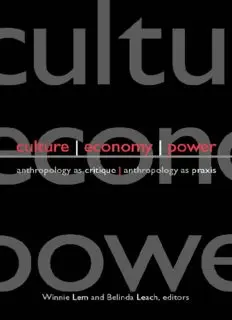
Culture, Economy, Power: Anthropology As Critique, Anthropology As Praxis (S U N Y Series in Anthropological Studies of Contemporary Issues) PDF
Preview Culture, Economy, Power: Anthropology As Critique, Anthropology As Praxis (S U N Y Series in Anthropological Studies of Contemporary Issues)
Lem-Leach:Culture,Economy,Power page i Culture, Economy, Power Lem-Leach:Culture,Economy,Power page ii SUNY series in Anthropological Studies of Contemporary Issues Jack R. Rollwagen, editor Lem-Leach:Culture,Economy,Power page iii Culture, Economy, Power Anthropology as Critique, Anthropology as Praxis EDITED BY Winnie Lem and Belinda Leach STATE UNIVERSITY OF NEWYORK PRESS Lem-Leach:Culture,Economy,Power page iv Published by State University of New York Press, Albany © 2002 State University of New York All rights reserved Printed in the United States of America No part of this book may be used or reproduced in any manner whatsoever without written permission. No part of this book may be stored in a retrieval system or transmitted in any form or by any means including electronic, electrostatic, magnetic tape, mechanical, photocopying, recording, or otherwise without prior permission in writing of the publisher. For information, address State University of New York Press, 90 State Street, Suite 700, Albany, NY 12207 Production by Diane Ganeles Marketing by Anne M. Valentine Library ofCongress Cataloging-in-Publication Data Culture, economy, power : anthropology as critique, anthropology as praxis / edited by Winnie Lem and Belinda Leach. p.cm.—(SUNY series in anthropological studies ofcontemporary issues) Includes bibliographical references and index. ISBN0-7914-5289-1 (alk.paper)— ISBN0-7914-5290-5 (pbk.: alk.paper) 1.Marxist anthropology. 2.Political anthropology. I.Lem, Winnie. II.Leach, Belinda, 1954– III.Series. GN345.15.C852002 306—dc21 2001032250 10 9 8 7 6 5 4 3 2 1 Lem-Leach:Culture,Economy,Power page v For Bill Roseberry In Memory Lem-Leach:Culture,Economy,Power page viblank Lem-Leach:Culture,Economy,Power page vii Contents Chapter 1. Introduction Winnie Lem and Belinda Leach 1 Part 1:Nations and Knowledge Chapter 2. Bicentrism, Culture, and the Political Economy of Sociocultural Anthropology in English Canada Thomas Dunk 19 Chapter 3. The Political Economy of Political Economy in Spanish Anthropology Susana Narotzky 33 Chapter 4. Anthropological Debates and the Crisis of Mexican Nationalism Guillermo de la Peña 47 Chapter 5. Political Economy in the United States William Roseberry 59 Chapter 6. “A Small Discipline”: The Embattled Place of Anthropology in a Massified British Higher Education Sector John Gledhill 73 Part 2:States and Subjects Chapter 7. Sentiment and Structure: Nation and State Dipankar Gupta 91 Chapter 8. Communists Communists Everywhere!: Forgetting the Past and Living with History in Ecuador Steve Striffler 107 Lem-Leach:Culture,Economy,Power page viii viii Contents Chapter 9. “We Were the Strongest Ones Here”: Transformed Livelihoods in Contemporary Spain Claudia Vicencio 121 Chapter 10. The Italian Post-Communist Left and Unemployment: Finding a New Position on Labor Michael Blim 136 Chapter 11. The Language of Contention in Liberal Ecuador A.Kim Clark 150 Part 3.Hegemonies and Histories Chapter 12. The Decline of Patriarchy? The Political Economy of Patriarchy: Maquiladoras in Yucatan, Mexico Marie France Labrecque 165 Chapter 13. Remembering “The Ancient Ones”: Memory, Hegemony, and the Shadows of State Terror in the Argentinean Chaco Gastón Gordillo 177 Chapter 14. Class, Discipline, and the Politics of Opposition in Ontario Belinda Leach 191 Chapter 15. Militant Particularism and Cultural Struggles as Cape Breton Burns Again Pauline Gardiner Barber 206 Chapter 16. Acquiescence and Quiescence: Gender and Politics in Rural Languedoc Winnie Lem 221 Chapter 17. Red Flags and Lace Coiffes: Identity, Livelihood, and the Politics of Survival in the Bigoudennie, France Charles R.Menzies 235 Chapter 18. Out of Site: The Horizons of Collective Identity Gavin Smith 250 References 267 Contributors 289 Index 293 Lem-Leach:Culture,Economy,Power page 1 1 CHAPTER Introduction Winnie Lem and Belinda Leach The philosophers have only interpretedthe world ...: the point is to changeit. —Marx,Theses on Feuerbach Provoked by Marx’s well-known, oft-cited statement, countless scholars have committed their intellectual labor toward deciphering the inner workings ofthe modern world with the view that such endeavours might serve in some way to transform it.Among those incited by this declaration ofpurpose and challenged by Marxist analysis are numerous anthropologists whose efforts in ethnography and theory have been devoted toward generating a critical body of knowledge, directed ultimately at contributing toward political programs ofchange.In Cul- ture,Economy,Powerthe work ofsome ofthose anthropologists is presented.This volume brings together a group of scholars who share the view that anthropo- logical knowledge implies critique—a critique of the modern world and a cri- tique of capitalism—and that to engage in and with anthropology represents an act ofpraxis.As such, our work in anthropology is committed to the emancipa- tory projects that find their origins in historical materialism, the critique of po- litical economy, Marx’s thoughts on class conflict and programs for social equal- ity. Indeed, such ideas have laid the foundations for the massive social and economic transformations that have been inaugurated in many different national contexts in the twentieth century.Yet as we live in our contemporary world, in a period that extends well beyond the lifetime of Marx, such ideas and programs for change have become discredited. Indeed, the decline of socialism and the triumph ofa neoliberal political and economic order in recent years have fanned the flames of criticism ignited by Marx’s detractors and supporters alike. But criticisms of his framework and declarations that he was wrong are as old as Marxist thought itself. Turn of the twentieth century populist and liberal cri- tiques, as well as more recent poststructuralist, feminist, and Foucauldian assaults on Marxist analysis (and also responses to them) have come to be so familiar, and to some extent mantric, that to review them here would be an exercise in 1
